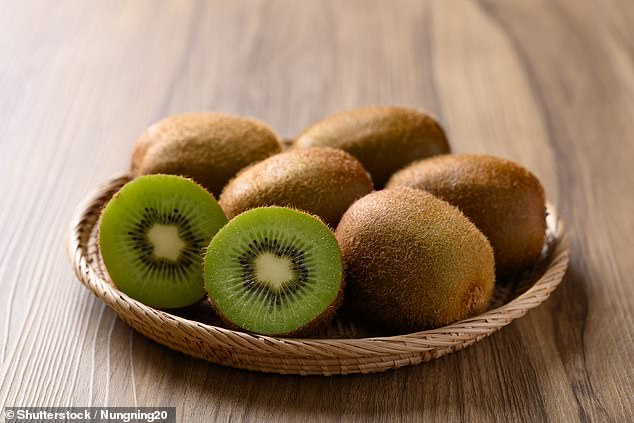Sufferers of chronic constipation have been handed the first ever official list of foods and supplements that can help to get things moving—and it includes some surprising everyday staples, such as kiwifruit and rye bread.
The new dietary guidelines, drawn up by experts at King’s College London and endorsed by the British Dietetic Association, offer evidence-based advice for adults living with the condition, which affects millions and can seriously impact quality of life.
Until now, clinical guidance has been limited to vague advice about eating more fibre and drinking plenty of water.
But the new report—published simultaneously in two international journals and hailed as a ‘milestone’ in digestive health—sets out, for the first time, which foods and supplements really work and which don’t.
After analysing data from 75 clinical trials, the researchers challenged long-standing assumptions about constipation, overturning some familiar home remedies while singling out others as genuinely effective.
They found that eating two to three kiwifruit a day for at least four weeks led to measurable improvements in bowel movement frequency.
Rye bread and high-mineral-content water—particularly types rich in magnesium and sulphates—were also shown to make a modest but meaningful difference.
Psyllium fibre, certain probiotic strains and magnesium oxide supplements were also beneficial.

A daily serving of kiwi fruit can help beat constipation, a new study has found
By contrast, some popular approaches were found to lack convincing evidence. Generic high-fibre diets—where patients are simply told to eat more fibre without specifying the source—did not perform well in clinical studies.
Nor did senna supplements, a plant-based laxative commonly used for chronic constipation.
The authors say their findings mark a ‘promising step forward’ in helping people self-manage symptoms through diet, as well as improving care by doctors, nurses and dietitians.
Dr Eirini Dimidi, Reader in Nutritional Sciences at King’s College London and lead author of the guidelines, said: ‘Chronic constipation can have a huge impact on someone’s day-to-day life.
‘For the first time, we’ve provided direction on what dietary approaches could genuinely help, and which diet advice lacks evidence.
‘Being able to improve this condition through dietary changes would allow people to self-manage their symptoms more and, hopefully, improve their quality of life.’
Constipation affects up to one in six adults and is a major driver of GP appointments and over-the-counter medicine use.
The researchers say the new guidance will make it easier for clinicians to offer tailored advice based on specific symptoms such as stool frequency, consistency or straining, rather than a one-size-fits-all approach.
Dr Dimidi added that while some foods and supplements clearly work, the quality of existing research remains limited, with many studies small in scale and focused on single ingredients rather than overall diet.
‘Eating a high-fibre diet offers many benefits to overall health,’ she said.
‘However, our guidelines found that there simply isn’t enough evidence to suggest it actually works in constipation specifically. Instead, our research reveals some new dietary strategies that could indeed help patients.’
Among the most effective single ingredients identified was magnesium oxide, a mineral supplement that in trials increased stool frequency by nearly four bowel movements a week compared to placebo, softened stool consistency, reduced straining and improved quality of life scores.
Kiwifruit, already popular as a natural digestive aid, also showed smaller but clear benefits, outperforming traditional fibre supplements such as psyllium in some measures.
Rye bread, often recommended for its fibre content, increased stool frequency slightly but was found to worsen bloating and gut discomfort compared with white bread—suggesting it may not suit everyone.
High-mineral water, naturally rich in magnesium, calcium and sulphates, improved constipation symptoms when consumed in quantities of half a litre to one and a half litres a day for up to six weeks.
The trials showing benefit involved waters naturally high in magnesium and sulphates—levels found in some continental mineral waters such as Hépar or Donat Mg—though these are not widely available in the UK.
Synbiotics—supplements combining probiotics and prebiotics—had no measurable benefit, nor did senna supplements, despite their long-standing reputation as herbal laxatives.
Professor Kevin Whelan, senior author and Professor of Dietetics at King’s College London, said: ‘This new guidance marks a promising step towards empowering health professionals and their patients to manage constipation through diet.’
The researchers emphasise that patients should consider individual health needs before making dietary changes.
High-mineral water, for instance, may contain large amounts of sodium or magnesium and is unsuitable for people with kidney or heart problems.
Experts say the guidelines represent a major advance in understanding how food affects gut function.
They hope the recommendations will be adopted by GPs and dietitians across the NHS, giving patients realistic, evidence-based options beyond over-the-counter laxatives and guesswork.
This article was originally published by a www.dailymail.co.uk . Read the Original article here. .

